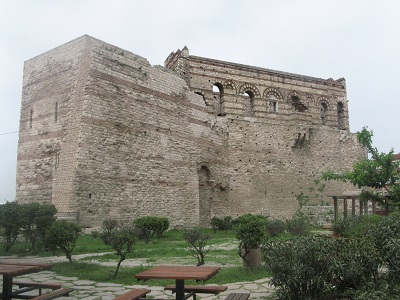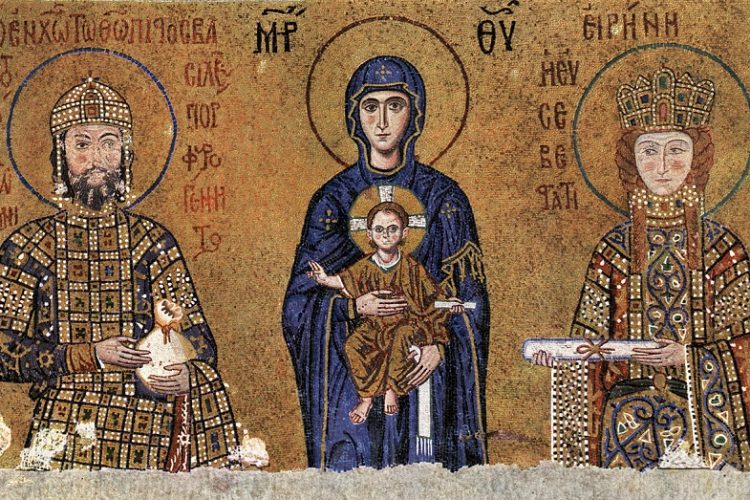The previous post in the Fall of Byzantium series is here.
When John Cantacuzenus entered Constantinople on the night of 2 February 1347, the Byzantine Empire had been at war with itself for a little over five years. The war had been unnecessarily destructive, prolonged by the intransigence of the regency. Even when their troops could not safely venture more than a few miles from the walls of Constantinople, they refused to negotiate a peace. Now John had the imperial family at his mercy, his troops surrounding their palace. This put him in a quandary: what terms should he impose on John V and his mother?
The Dilemma
Cantacuzenus had insisted on upholding the rights of John Palaeologus from the outset of the civil war. When he was acclaimed emperor by the army in 1341, and at every official occasion after that, he was careful to have John V’s names read first in the list of honors. Not all of his supporters agreed with this conciliatory policy. In their view, the regency had sacrificed its moral legitimacy several times over: first in deposing an innocent Cantacuzenus as Grand Domestic, then being implacably hostile to any kind of settlement; they had incited horrific social strife and allowed the Serbs and Bulgarians to pick the empire clean. Would it not be best to just do away with the Palaeologus boy, maybe blind him and send him off to a monastery? What more but trouble could come from the boy and his caretakers?
Things were not so simple, of course. As much as everyone was relieved that the civil war was over, the Palaeologus family still had many supporters. The social unrest in the empire had not entirely dissipated, and the anti-aristocratic faction still looked to John V as a figurehead. He was still the best hope of helping mend the deep wounds to society.
There was also the question of morale. In such dark times, the empire needed inspiration to survive. The Palaeologus family had ruled since John V’s great-great-grandfather retook Constantinople in 1261, before nearly anyone alive had been born: it was a reminder of the empire’s glorious past and of triumph in the empire’s darkest hour. John V’s youth and innocence, moreover, could be a source of hope after the sordid events of the past few years. The boy was a symbol of both past and future, and perhaps with proper tutoring, he would even turn out to be a fine ruler.
In Cantacuzenus’ eyes, this was no dilemma at all. He had been very consistent in maintaining John V’s rights all along, right up to the capture of Constantinople. He never agonized over whether to depose the young emperor, seeing the good reasons not to. He understood the downside in deposing Palaeologus, but did not fully realize the downside of keeping him on the throne. Cantacuzenus’ supporters did, and urged him to get rid of the boy. The question was therefore a dilemma for the Cantacuzenist faction, if not for the man commanding it.
Negotiations

This difference of opinion meant that John had to restrain his troops when, getting impatient, they stormed part of the imperial palace. For all they respected Cantacuzenus as their commander, they had their own reasons for fighting. Many of their families had been persecuted by the regency, and they themselves had become hardened by the bitterness of the conflict. Cantacuzenus realized that any agreement would have to be reached quickly, and sent in representatives to negotiate.
The two sides soon reached an agreement: John Cantacuzenus would be formally crowned co-emperor as John VI, and rule as the senior of the pair for ten years; after that point, John Palaeologus would rise to equal status. Palaeologus would marry Cantacuzenus’ daughter Helena. Prisoners on both sides were released, a general amnesty was declared, and the empire was made whole once again.

The civil war had come at an enormous cost. All of the gains made by Andronicus III were erased, and then some. Serbia continued the war into 1350, completely swallowing up Macedonia and northern Greece; Bulgaria had meanwhile gained in Thrace. Only southern Thrace, the neighborhood around Thessalonica, the southern Peloponnese, and a few Aegean islands were left to the empire.
Inside the empire the effects were even worse. The treasury was empty, troops had been needlessly killed, and the economy had been disrupted. Worst of all, society was even more divided. The war had resolved none of the existing divisions, and John’s clemency did little to assuage feelings; everyone was left embittered. The best that anyone could hope was that the various actors would piece something together from the wreckage of the recent war. Nevertheless, it was on a hopeful note that on 8 February 1347, all parties reached the final agreement that brought peace to the empire.
In May, the Black Death struck.
